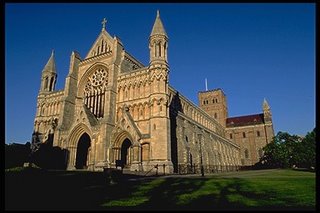
I wrote the following reflection about a year ago for another context. Ben Meyer's discussion of the Virgin Birth (entry: December 23, 2006) over at Faith and Theology inspired me to dig it out of the archives for my readers. I'd appreciate any comments that you may wish to make.
+++++++
In my estimation, apostolic churches have a unique and peculiar calling within the kingdom of God to preserve and guard what can be termed the "Great Story" or "True Myth" (in Lewis' sense). This is the story of the New Testament: the mythos to which the early fathers provided normative articulation in ancient creedal and doxological symbols that are with us to the present day -- preserved in the liturgies of the great apostolic churches.
Yet, on this side of the postmodern curve, academic honesty compels the scholar to admit that "proving" the historicity of the mythos is impossible. But then it should be noted that disproving the historicity of the mythos is just as certainly impossible (a fact that the likes of John Shelby Spong and company disingenuously dismiss). Simply put, the mythos – the very object of the Church's faith – is not subject to historical or scientific investigation (either in proof or disproof). Rather it transcends critical inquiry, while, paradoxically, benefiting in the many new ways of understanding the Faith that may thus emerge from such investigation into the biblical milieu itself.
Be that as it may, the mythos or story is the starting point for all true Christian theology, whether one assumes the historicity of, say, the virgin birth or not. In this, as I said before, the apostolic churches have a unique calling. What would the Christian Faith be without the virgin birth? the resurrection? the ascension? or the parousia? What would it be without the doctrines of the Trinity? the Incarnation? or the Hypostatic Union? Make of these things what you will, but any supposed “Christianity” lacking the core elements of its mythos would be unrecognizable. To lose these things would be to displace the Christian Faith with something else, which at best would only be similar in appearance.
However, to answer more directly what must surely be the most pressing question raised by this line of thinking: The Christian Faith is not a belief in the historicity of the resurrection (as an end in itself), but rather faith in the resurrected Christ; it is not a belief in the historicity of the virgin birth (as an end in itself), but rather faith in the Christ who was born of a Virgin.




